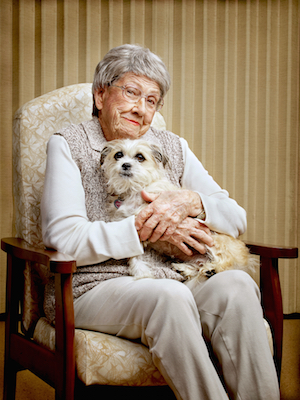
We love our pets. So much so that Americans spent more than $60 billion on the critters in 2015.
I love my dogs and get great pleasure from seeing them every day after work. They’re excited to see me — as dogs always seem to be — and I enjoy taking them for walks in the Colorado sun. I’d certainly miss them if they were no longer part of my life. After all, they’re family.
Who’s in the dog house?
Today’s older adults live in a variety of settings — nursing homes, long-term care facilities, apartments and homes — all affording different levels of pet ownership options. Many older adults still enjoy having a pet around, and a 2014 survey found that 53% of those aged 65 to 69 years own pets, with that number falling significantly, to 34%, for those 70 and older.
Adults who fall into these older age groups can continue to benefit from contact with a pet, whether it lives with them or visits. Living circumstances, though, often dictate whether the older adult has the full- or part-time company of a pet.
Many senior living communities have a finite amount of space for residents — from limited room size to outdoor areas — making pet ownership for residents a challenge. But in many cases, it’s practical to allow older adults in senior living environments to have small pets, although operationally and logistically, it may need further investigation for several reasons:
- Residents who are allergic to cats or dogs
- Lack of an on-site or nearby dog park
- The cognitive and physical ability of the resident to care for the pet
- Financial resources for veterinarian visits, food and pet-deposit costs
Assuming facilities can mitigate these potential issues, research studies have shown pets to be a positive factor in the lives of older adults, especially for those adults who have few human friends.
For the elderly population in general, having a pet is correlated with an “enhanced emotional status.” For those older adults with few friends and who have gone through the recent death of a loved one, having a pet is associated with less “emotional distress,” according to the journal Anthrozoos.
Loneliness is an emotion faced by most people at one time or another, and it may be heightened in older adults who reside in senior living facilities. Although people are all around, family may live across the country, and long-time friends often have passed away or live in different facilities. For senior living communities unable to permanently accommodate pets, research has found that bringing animals to the community for visits is a viable way to reduce loneliness among residents.
Who let the dogs out?
A study in the Journal of Gerontology found that the presence of a pet-therapy dog had a positive effect on residents at several Mississippi long-term care facilities. Residents petted and walked the dog; they groomed and played with it as well. At the end of the six-week study, researchers said, resident loneliness decreased. The study also established that one session a week of just 30 minutes provided a statistically significant reduction in participant loneliness. Study participants were primarily women who were aged 75 or more years.
 A one-year study of approximately 1,300 adults aged 65 or more years, published in the Journal of the American Geriatrics Society, found that companion animals had a positive effect on “maintaining or slightly enhancing [activities of daily living] levels of older people.” The study also found those older adults without pets actually had a decline in ADLs compared with pet owners. “The relationship between pet ownership and ADLs may be because older pet owners tend to stay or become active and, therefore, maintain their physical health,” according to the authors.
A one-year study of approximately 1,300 adults aged 65 or more years, published in the Journal of the American Geriatrics Society, found that companion animals had a positive effect on “maintaining or slightly enhancing [activities of daily living] levels of older people.” The study also found those older adults without pets actually had a decline in ADLs compared with pet owners. “The relationship between pet ownership and ADLs may be because older pet owners tend to stay or become active and, therefore, maintain their physical health,” according to the authors.
Whether a senior living complex allows pets to live on-site with older adults or facilitates scheduled pet visits, research shows both are beneficial to the well-being of older adults. The many benefits of spending time with a pet seem enough to regularly invite them into the lives of older adults.
Photo: Alice Simkins spends her time at an InnovAge day center visiting friends and cuddling with Rosie, a therapy dog.
Maureen Hewitt is the president and CEO of InnovAge, a Denver-based provider of comprehensive healthcare services for older adults in California, Colorado and New Mexico. She has held this role since 2006 and has led for-profit and nonprofit healthcare organizations for more than 25 years. Hewitt’s experience includes leading skilled nursing/sub-acute care facilities and acute care and rehabilitation hospitals, as well as serving in volunteer board positions.


